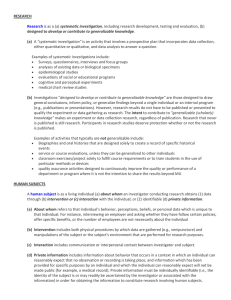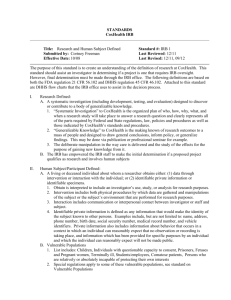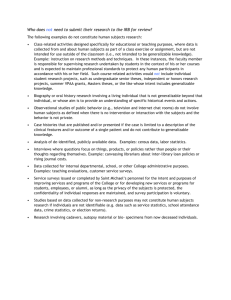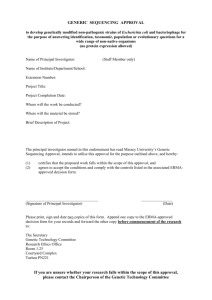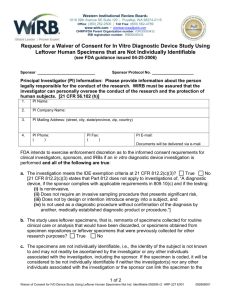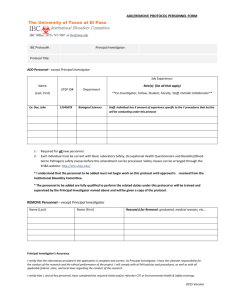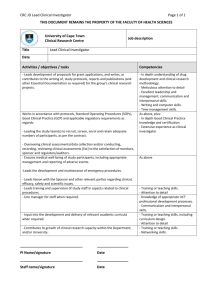Emmanuel College Committee for the Protection of Human
advertisement
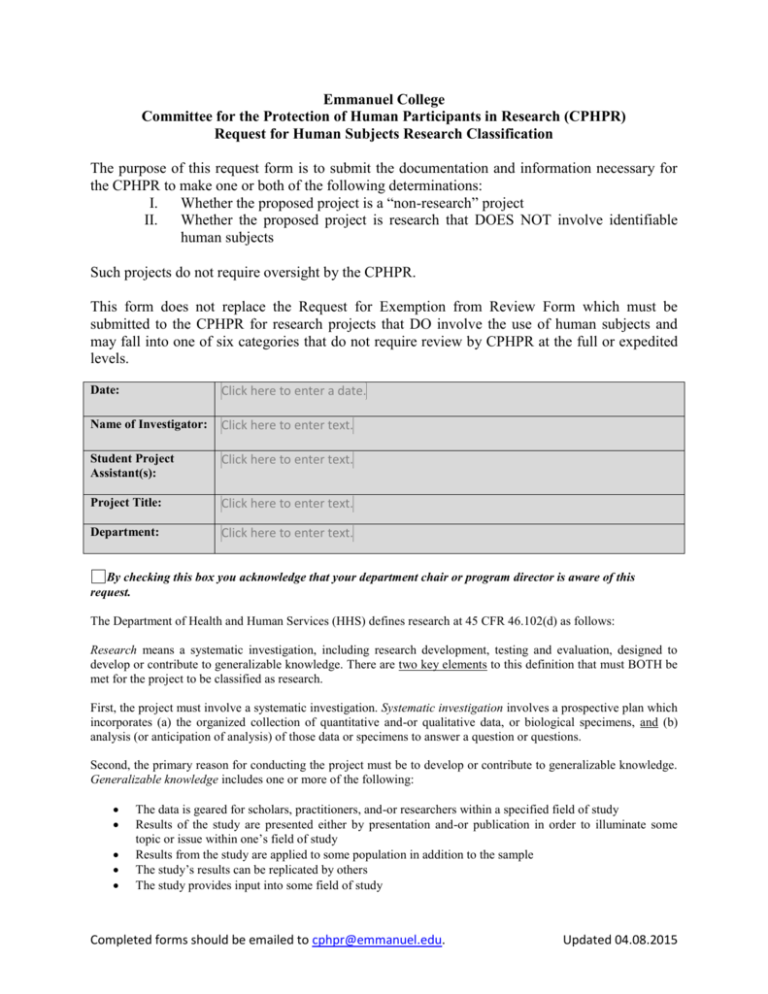
Emmanuel College Committee for the Protection of Human Participants in Research (CPHPR) Request for Human Subjects Research Classification The purpose of this request form is to submit the documentation and information necessary for the CPHPR to make one or both of the following determinations: I. Whether the proposed project is a “non-research” project II. Whether the proposed project is research that DOES NOT involve identifiable human subjects Such projects do not require oversight by the CPHPR. This form does not replace the Request for Exemption from Review Form which must be submitted to the CPHPR for research projects that DO involve the use of human subjects and may fall into one of six categories that do not require review by CPHPR at the full or expedited levels. Date: Click here to enter a date. Name of Investigator: Click here to enter text. Student Project Assistant(s): Click here to enter text. Project Title: Click here to enter text. Department: Click here to enter text. By checking this box you acknowledge that your department chair or program director is aware of this request. The Department of Health and Human Services (HHS) defines research at 45 CFR 46.102(d) as follows: Research means a systematic investigation, including research development, testing and evaluation, designed to develop or contribute to generalizable knowledge. There are two key elements to this definition that must BOTH be met for the project to be classified as research. First, the project must involve a systematic investigation. Systematic investigation involves a prospective plan which incorporates (a) the organized collection of quantitative and-or qualitative data, or biological specimens, and (b) analysis (or anticipation of analysis) of those data or specimens to answer a question or questions. Second, the primary reason for conducting the project must be to develop or contribute to generalizable knowledge. Generalizable knowledge includes one or more of the following: The data is geared for scholars, practitioners, and-or researchers within a specified field of study Results of the study are presented either by presentation and-or publication in order to illuminate some topic or issue within one’s field of study Results from the study are applied to some population in addition to the sample The study’s results can be replicated by others The study provides input into some field of study Completed forms should be emailed to cphpr@emmanuel.edu. Updated 04.08.2015 Some projects may include systematic investigation (e.g., a Quality Improvement [QI] project aimed at improving local systems of care), but have no intent to generate generalizable results. Likewise, some projects have results worth sharing through publication or presentation, but include no element of systemic investigation. Those projects are more accurately classified as education, not research. In fact, the goal of most educational activities is to spread or transfer knowledge; however, this does not automatically imply that the activity involves systematic investigation. If a project has only ONE of the key elements in the definition of research, then the activity is NOT research (adapted from University of Michigan). HHS regulations define human subjects at 45 CFR 46.102(f) as follows: Human subject means a living individual about whom an investigator (whether professional or student) conducting research obtains: 1. data through intervention or interaction with the individual, or 2. identifiable private information. Intervention includes both physical procedures by which data are gathered (for example, venipuncture) and manipulations of the subject or the subject's environment that are performed for research purposes. Interaction includes communication or interpersonal contact between investigator and subject. Private information includes information about behavior that occurs in a context in which an individual can reasonably expect that no observation or recording is taking place, and information which has been provided for specific purposes by an individual and which the individual can reasonably expect will not be made public (for example, a medical record). Private information must be individually identifiable (i.e., the identity of the subject is or may readily be ascertained by the investigator or associated with the information) in order for obtaining the information to constitute research involving human subjects (bolding added for emphasis). For purposes of this document, coded means that: 1. identifying information (such as name or social security number) that would enable the investigator to readily ascertain the identity of the individual to whom the private information or specimens pertain has been replaced with a number, letter, symbol, or combination thereof (i.e., the code); and 2. a key to decipher the code exists, enabling linkage of the identifying information to the private information or specimens. Completed forms should be emailed to cphpr@emmanuel.edu. Updated 04.08.2015 1. . Description of the proposed project: Click here to enter text. 2. Is the primary intent of the project to develop or contribute to generalizable knowledge? Please explain: Yes No Click here to enter text. 3. Does the project include the organized collection and analysis of data to answer a question(s)? If yes, please describe: Yes No Click here to enter text. 4. Will you have interventions or interactions with human subjects? If yes, please describe: Yes No Click here to enter text. Completed forms should be emailed to cphpr@emmanuel.edu. Updated 04.08.2015 5. Will you be using pre-existing data? Yes No If yes, (a) Does the data contain any private information that is individually identifiable? Yes (b) Has the data been coded? Yes No (c) Does a key to decipher the code exist? Yes No (d) Please attach a copy of all instruments used to collect the data (i.e., surveys, etc.) No ----------------------------------------------------------------------------------------------------------------------------- --------------CPHPR Office Use only (please file) Action Taken: Click here to enter text. X CPHPR Chair's Signature Click here to enter a date. Completed forms should be emailed to cphpr@emmanuel.edu. Updated 04.08.2015
